The fiber optic is in Dolisie since 2009, but it is connected to nothing. The internet cafés are slower than a 2G network. Since the youth can access Facebook on their phones (there is even a 3G signal in the city), the internet cafés are deserted. We have no reason to stay longer.
Plus, the Consulate of Angola doesn’t even let me enter into the building. The security at the gate booth tell me that they issue transit visas only and only for residents of Congo, so I am kindly asked to see somewhere else. I know this is not completely true, but I had planned to visit the bigger consulate in Pointe-Noire anyway.
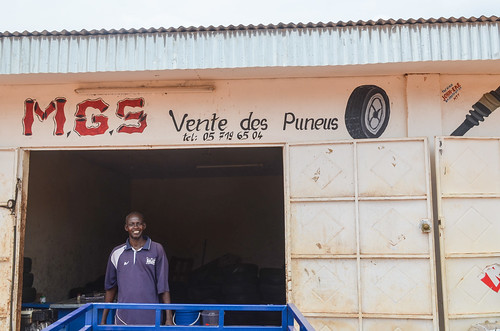
The road leaving Dolisie to Pointe-Noire is brand new, since the Chinese have just completed it.
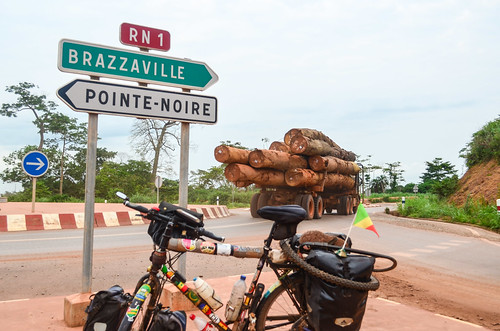
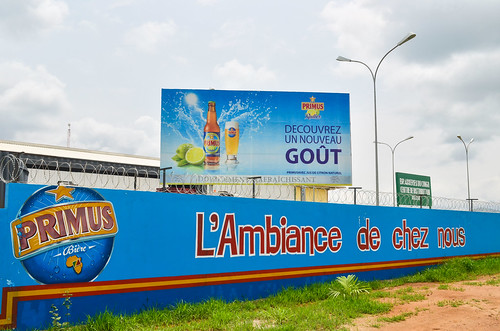
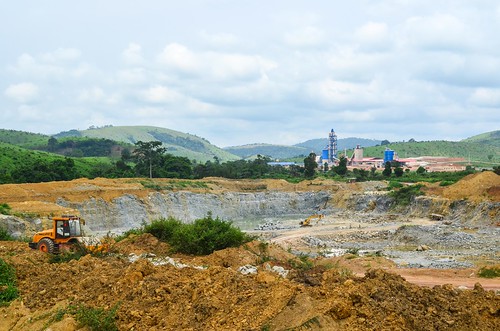
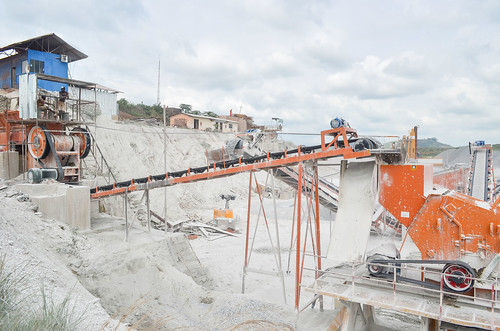
A brand new toll gate, not operational yet, marks the entrance on the highway. I find it weird that, as the new road replaces the old one, it will leave drivers with no other options than paying the highway fee. But even with a toll fee, it will probably end up cheaper than it used to be: it took a day to drive the 150 kilometers before, not mentioning the breakdowns, and only 2-3 hours now.
There is a large baobab just next to the toll gate, called l’Arbre de Brazza. It is said that the same Pierre Savorgnan de Brazza rested under this tree.
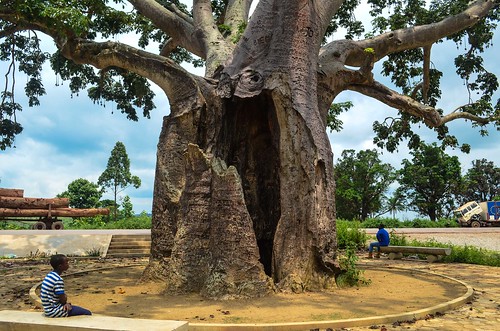
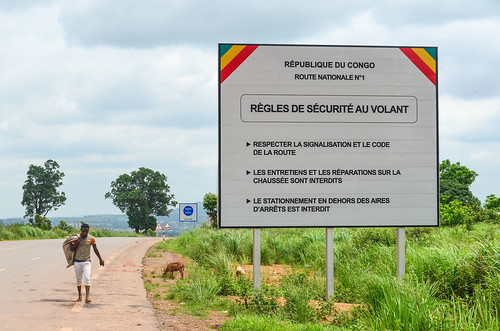
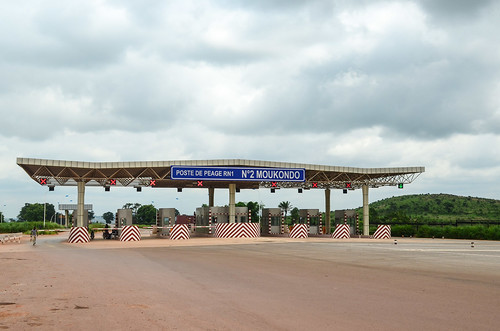
One would expect that a nice road makes the journey safer. But truck drivers probably still drive as if they were on a dirt road, changing sides depending on where the road is best and on where they don’t need to brake. There is a fair amount of accidents and truck wrecks.
In the same time, the Chinese are reinforcing the mountain walls, and sometimes laying another layer of tar on the road. It was inaugurated by the president a year ago, but the white pavement marking is still missing in some places.
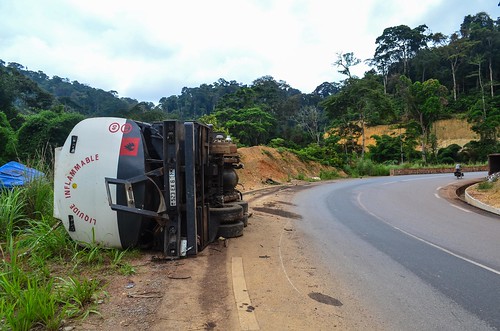
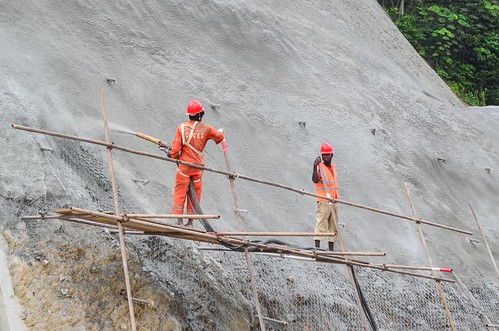
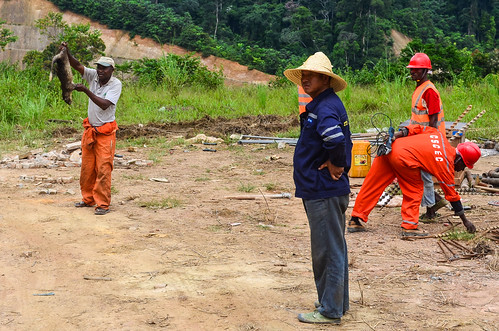
The road passes through the biosphere reserve of Dimonika, where a sign reads that dynamite fishing is prohibited. These low mountains are called the Mayombe. It is rather steep for the area but I don’t feel that I am sweating more than usual. There must be a ceiling on the amount of sweat that a man can produce anyway.
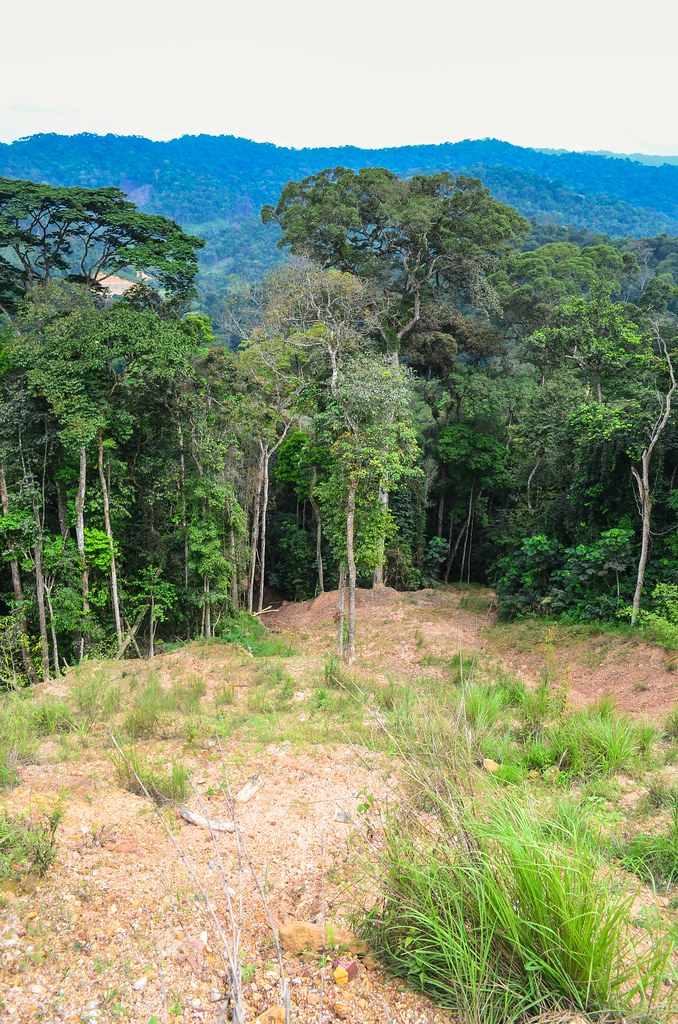
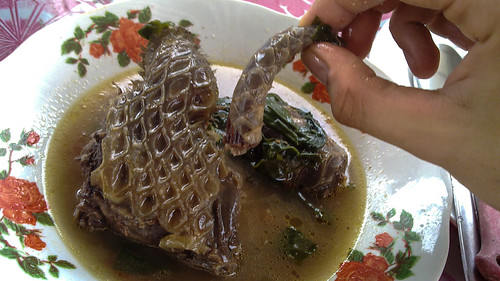
In Mvouti, I complete my bush meat experience with pangolin. It is a cute animal slightly smaller than a porcupine, but much tastier. I have never seen one alive, but I start to get accustomed to wild animals by their taste rather than by their sounds. I get three pieces for 1200 CFA with bread. The finely squared skin and the dark red meat inside tastes closer to pork than game meat.
The massif du Mayombe is also where the Mayo mineral water is from. We refill our bottles in a turn where a spring flows. Every driver stops here as well.


There was this road worker running after cars with a porcupine, under the eyes of the Chinese boss with whom he cannot communicate. Bush meat on sale doesn’t last long here, it is very popular. He managed to sell the animal for around 10’000 CFA. Later, I saw people selling a gazelle alive, twice. The second was bought for 6500 CFA (10 €).

There are many campements in the Mayombe, people are growing bananas. One man tells me that during the inauguration of the road, one year ago, the president Sassou was not satisfied and he asked the Chinese to build it again. I agree, the tar has sometimes low-frequency corrugated iron surface, and for sure potholes will appear before its second anniversary.
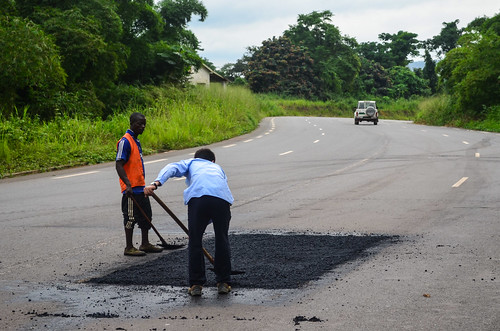
We stop for camping when it is almost night. Once in our empty field, we visit what we believe is a roof nearby. We can’t see much with the moonlight. And it happens to have two people in it! The house is a wooden shack with a tarp as a roof. The two men inside say they are collecting scrap iron. There are very old damaged trucks on the old road, and they carry the pieces they can, without any tool. They still don’t know how they will carry it to Pointe-Noire, where they could sell it for 160 CFA (0,25 €) per kilogramme.
They seem friendly but I am not comfortable with the fact that they come from DR Congo, they squat in a shack belonging to someone else, with three plastic bags as luggage, and have probably no ties in Congo. They remained quiet when they saw us entering in the field and thought we were locals. Since our bikes and panniers are more valuable than 160 CFA / kg, I prefer to continue and find a better place to camp.
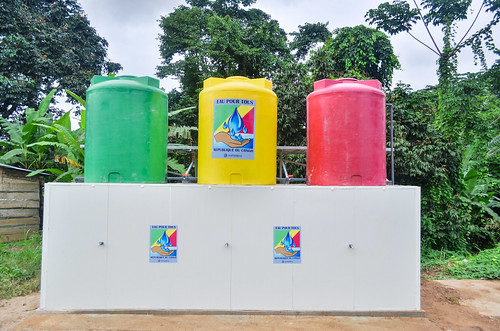
We cycle at night three more kilometers until we see a light. And it is a real light, not a fire, meaning there is electricity. It is a small roadside bar where neighbors and a truck driver are also stopped: the driver realized his lamps were broken just before driving into the mountain.
Since P. and I. are drinking here and welcome us to stay for the night, we are happy to do so. It is a single house with a diesel generator in the middle of nowhere, with friendly and talkative people. They made a small fire to repel the fourous. The light pollution we can see a bit further is a Chinese camp near Doumanga.
We drink together and talk about everything. Politics too, even if we could foresee the contents of the discussion. We are apparently not allowed to say Sassou, like we would say Francois Hollande, Sarkozy or Obama, but only “President Sassou”. Despite the respect given to his name, he is not appreciated: in so many years, he didn’t set up a reliable electricity network and piped water systems in the economic capital. “But with him, there is peace“. Although the peace happens “thanks to his armed militia“. Our hosts claim that they would get killed if they were saying this publicly.
Democracy is a vague concept, as elections are made somehow properly but announcements on the radio are completely different. They say they can’t show opposition, or the weapons would talk. The civil war is over, but for sure not on everybody’s mind. One man is lucid about the fact that France brought weapons to Sassou when Lissouba was president.
The discussion is less tense once we slowly switch to gentle topics. Credit is given to Omar Bongo’s ruling in Gabon, because when he came to power “all the prostitutes in Congo were Gabonese. But they soon went back home and the vacancy was filled by Zairoises (DR Congo)“.
The petrol they need to buy for the generator is sold in the bush at 850 CFA a liter, slightly more than a euro, despite the presence of a refinery nearby. It is way too much in a country where oil is extracted. The oil is precisely under our feet. Prices were around 300 CFA in Nigeria, and probably close to nothing in Venezuela.
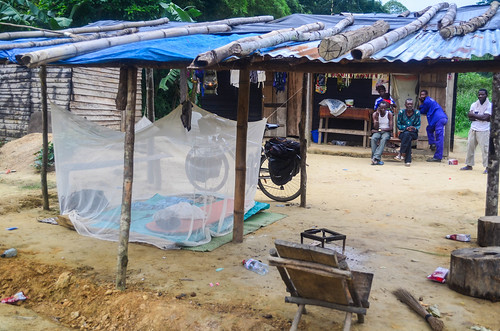
We also learn that the Turbo King beer from Kinshasa is 1500 CFA in Congo (import price) but apparently twice stronger and twice better than the same brewed in Brazzaville. And the special mention goes out to the man who said that “boxed wine is good, albeit made from grapes” …
The fourous are still here at breakfast. Those invisible mosquitoes are completely eating me alive.
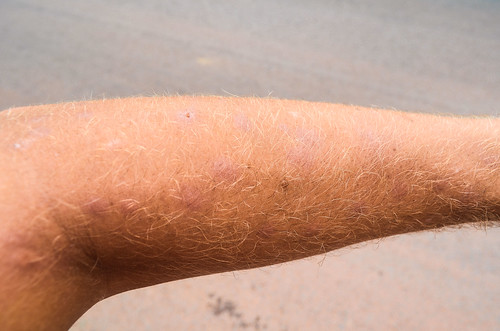
We will make it to Pointe-Noire tonight, but we cannot see the coast yet. The Chinese are pouring a second layer of tar on the road and they say the original one has cracks already. I doubt the second one will last for long either …
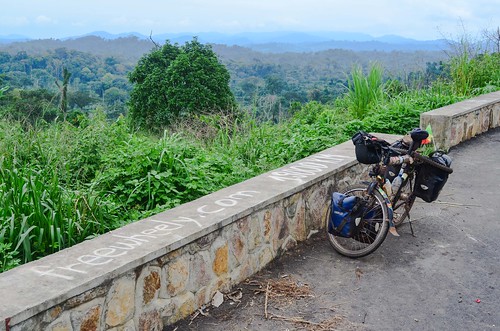
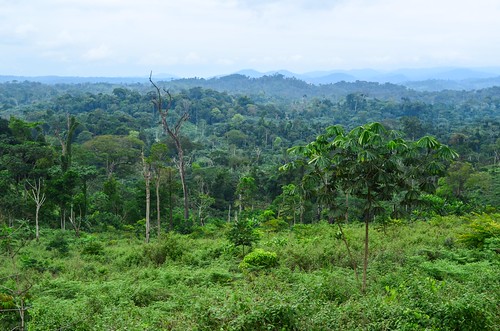
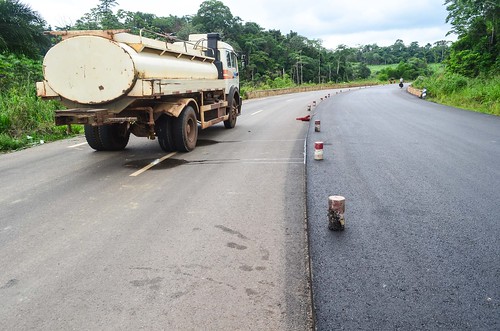
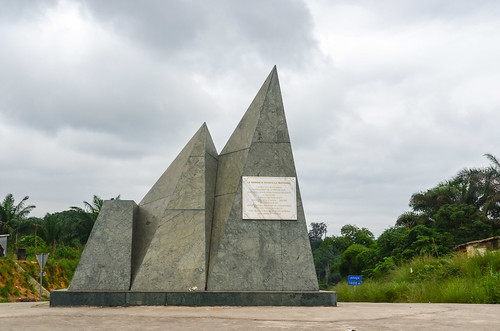
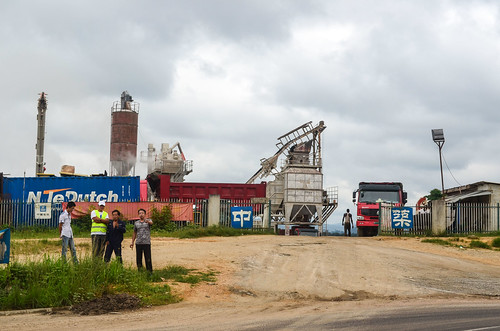
We refill out water bottles at the Chinese tar plant. Local workers are making fun of “the Chinese who can speak French” and asks us to direct our questions about the plant to him. He only speaks three words of French. After Arabic, French and English, could Chinese be the most useful language on the continent?
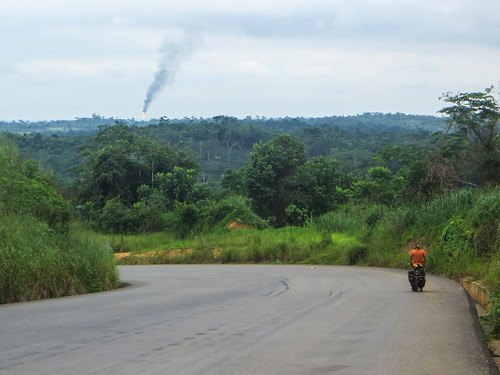
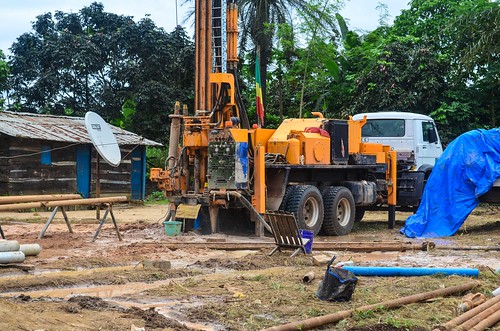

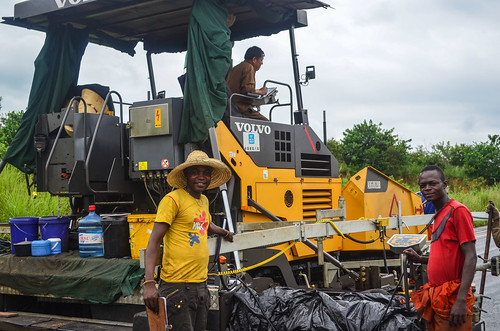
The bright flame we had seen some 20 km ago is now just next to the road. It is the flare stack of an onshore oil field, belonging to Eni, which weighs, in terms of revenue and employees, about 75% of Total.
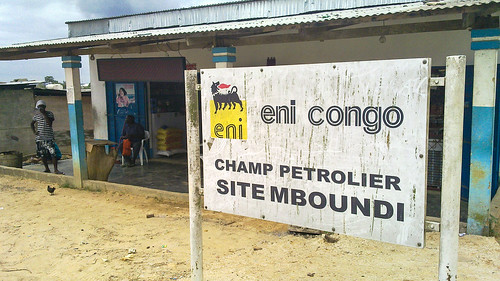

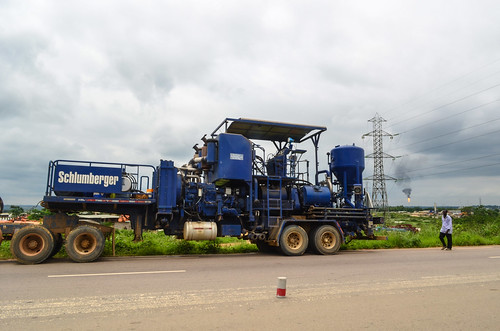
Cyril initiates a mini photography workshop during our Coca-Cola break.

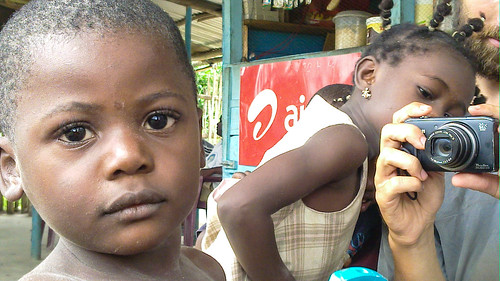
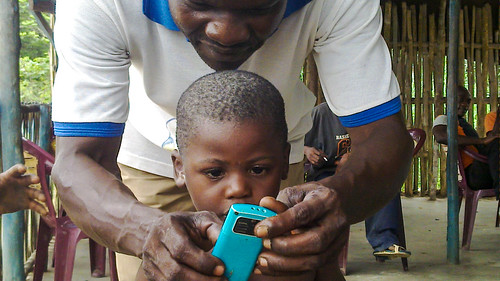

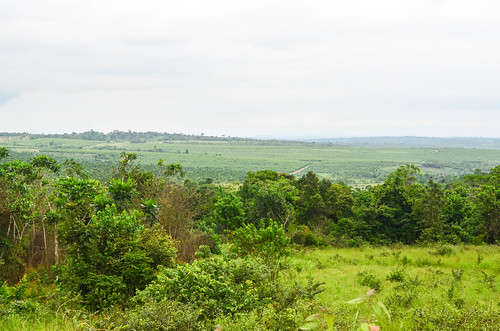
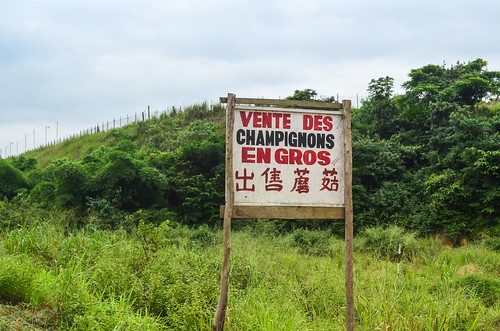
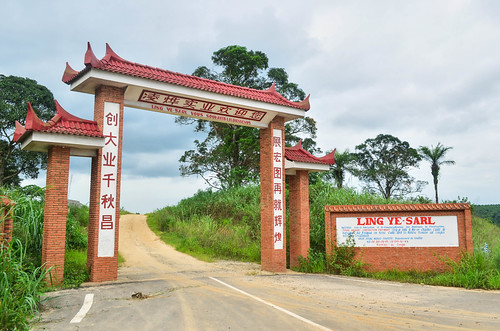
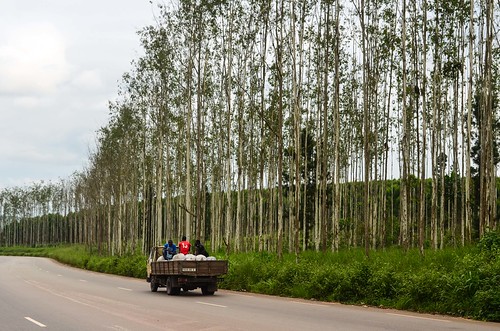
We have to cross the Vindoulou market at the entrance of Pointe-Noire. The sand is reducing the road width to half its size, creating a big mess.We make our way through the trucks, the shops and the sellers. The drivers are moderately crazy, I have seen worse.
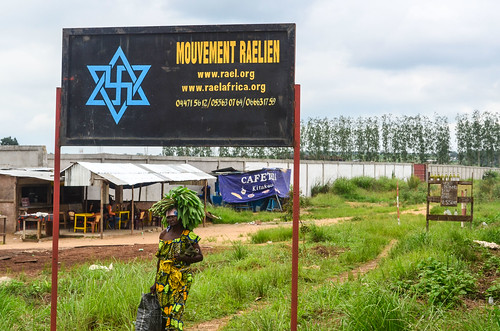
We reach the house of Katia and Nicolas. I had her contact from Pascal more than a year ago, without knowing if I would pass through Pointe-Noire. The surprise is that Nicolas also cycled 20’000 KM through Asia some years ago …
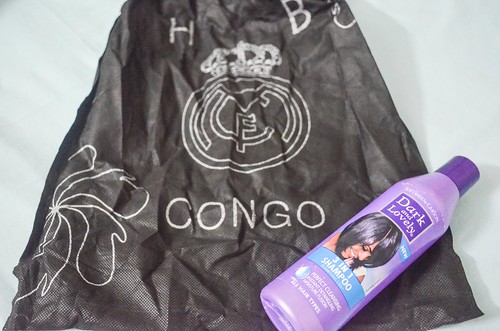
So, what to expect, when you cycle through Africa, and reach the nice house of White people? Everything but someone saying “look, I bought worms today, let’s eat them alive“.

We had seen already those Nsombé worms at a small market in Cameroon, but they were not cooked. When they are crawling together in a box, they don’t look so appetizing … Fortunately, Katia cooks them well and it goes down very well.
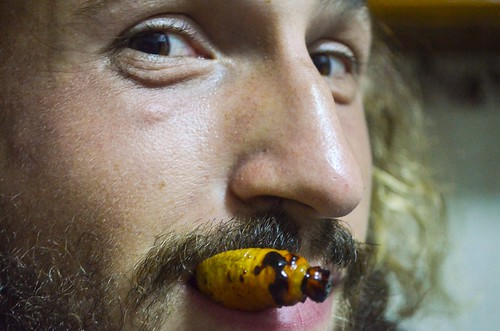
However, we tried one alive beforehand. The taste was different, so was the experience …






Les Chinois ont dû rajouter du goudron parce qu’ils ont voulu gagner plus en n’en mettant pas le nombre prévu, en résumé. C’est pourquoi avant de repasser du goudron , ils ont dû enlever la bande blanche centrale, ça c’est fait au marteau et au burin! Les ouvriers congolais alignés et assis par terre sur le goudron à taper du burin du petit matin au soir avec juste une boîte de sardine comme repas le midi! Le Massif du Mayombe en aura vu des souffrances jusqu’à notre époque!